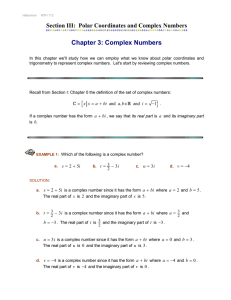Polar Coordinates
advertisement
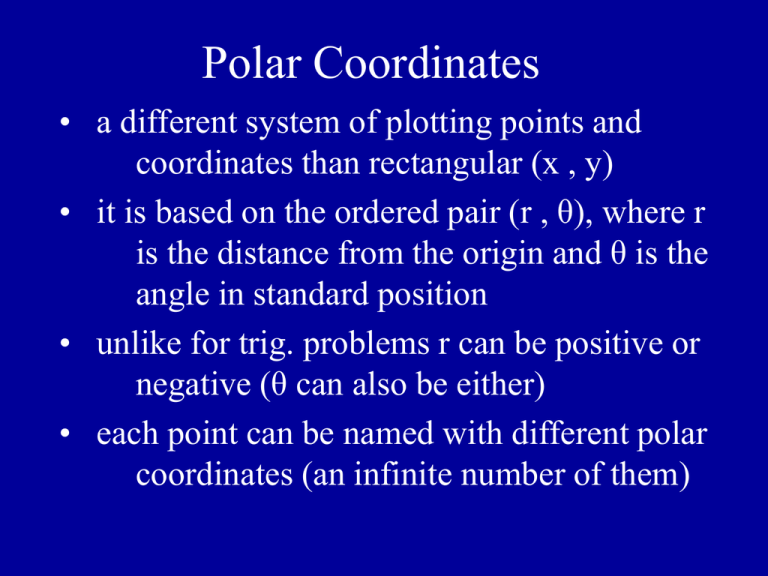
Polar Coordinates • a different system of plotting points and coordinates than rectangular (x , y) • it is based on the ordered pair (r , θ), where r is the distance from the origin and θ is the angle in standard position • unlike for trig. problems r can be positive or negative (θ can also be either) • each point can be named with different polar coordinates (an infinite number of them) Example: Plot the point (3 , 150º) 3 Some other ways of naming that same point: (3 , -210º), 5 3 , and 6 - 7 3 , and others 6 What about negative values of r? answer: to graph (-3 , 150º), go 3 units out in the opposite direction from 150º 3 Finding all polar coordinates of (r , θ) Positive r: add multiples or 360º or 2π (r , 2n) or (r , 360n) Negative r: add 180º or π, then you can add multiples of 360º or 2π (r , (2n 1) ) or (r , (2n 1)180) Coordinate Conversion • Use the following to convert (x , y) (r , θ) r x y 2 2 y tan x & adjust if necessary -1 • Use the following to convert (r , θ) (x , y) x r cos y r sin Example #1 3 Convert to (x , y): 4 , 4 3 x 4 cos 4 3 y 4 sin 4 2 2 2 4 2 2 2 2 4 2 (2 2 , 2 2 ) Example #2 Convert into (r , θ): (-3 , -7) r (3) (7) 2 2 58 tan (7 / 3) 66.8 1 add 180 because its in quadrant III 246.8 ( 58 , 246.8) Practice Problems 1.) convert into (x , y): (6 , 240) 2.) convert into (r , θ) : (4 , -2) Practice Problems 1.) convert into (x , y): (6 , 240) 1 x 6 cos 240 6( ) 3 2 3 y 6 sin 240 6( ) 3 3 2 (3 , 3 3) Practice Problems 2.) convert into (r , θ) : (4 , -2) r 4 (2) 2 2 20 2 5 2 tan 26.6 or 333.4 4 1 (2 5 , 26.6) or (2 5 , 333.4) Equation Conversion • equations in polar form have r in terms of θ example : r = 4cosθ • these equations can be graphed using the calculator or by hand (section 6-5) • To convert equations between rectangular form and polar form use: x r cos y r sin r x y 2 2 2 Example #3 Convert into a rect. equation r 4 cos r 4r cos (multiply both sides by r) x y 4x (substitut e w/ converters ) 2 2 2 x2 4x y2 0 (subtract 4x) x 2 4 x 4 y 2 4 (complete the square) (x 2 ) y 4 2 2 (factor) This is the equation of a circle w/ center at (2 , 0) and radius 2 Example #4 Convert into polar equation ( x 3) ( y 2) 13 2 2 this is the equation of a circle with center at (3 , 2) and radius of 13 I’ll do this problem on the board. Practice Problem #3 Convert into a rectangular equation: r 5 csc r 5 csc r5 sin r sin 5 y5 a horizontal line Distance Between Two Polar Coordinates • use Law of Cosines • the two r values are the sides and θ can be found by taking the difference between the two angles • See textbook example #7 for details r1 θ r2
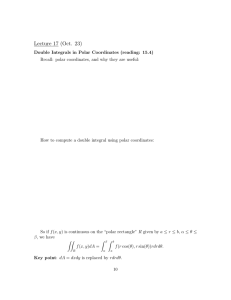
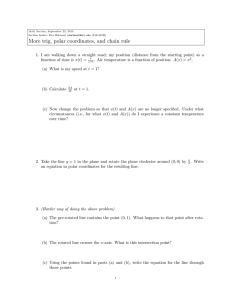
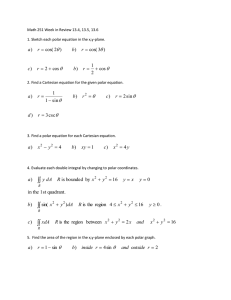
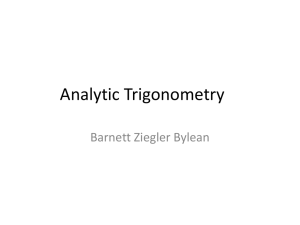
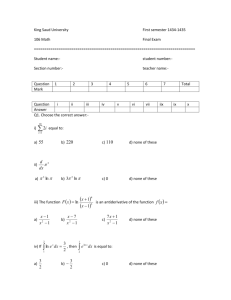

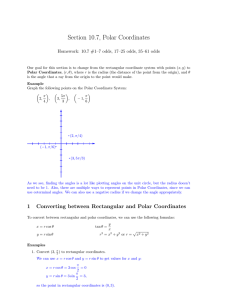
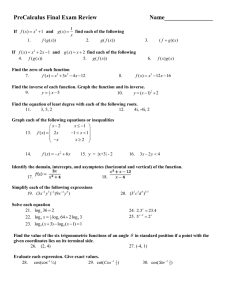
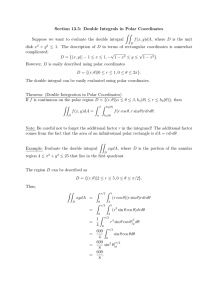
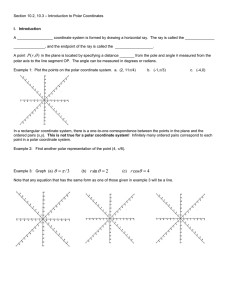
![MA1S12: SOLUTIONS TO TUTORIAL 10 ∈ [0, 2π]](http://s2.studylib.net/store/data/010730302_1-1efb5a0ba4b5867c41b2895ccd75ba1d-300x300.png)
